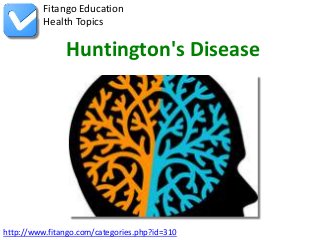
Huntington's Disease
- 1. Fitango Education Health Topics Huntington's Disease http://www.fitango.com/categories.php?id=310
- 2. Overview Huntington's disease (HD) results from genetically programmed degeneration of brain cells, called neurons, in certain areas of the brain. This degeneration causes uncontrolled movements, loss of intellectual faculties, and emotional disturbance. National Institute of Neurological Disorders and Stroke: 1
- 3. Symptoms Some early symptoms of HD are mood swings, depression, irritability or trouble driving, learning new things, remembering a fact, or making a decision. As the disease progresses, concentration on intellectual tasks becomes increasingly difficult and the patient may have difficulty feeding himself or herself and swallowing. 2
- 4. Symptoms National Institute of Neurological Disorders and Stroke: 3
- 5. Diagnosis The rate of disease progression and the age of onset vary from person to person. A genetic test, coupled with a complete medical history and neurological and laboratory tests, helps physicians diagnose HD. Presymptomic testing is available for individuals who are at risk for carrying the HD gene. In 1 to 3 percent of individuals with HD, no family history of HD can be found. 4
- 6. Diagnosis National Institute of Neurological Disorders and Stroke: 5
- 7. Treatment Physicians prescribe a number of medications to help control emotional and movement problems associated with HD. In August 2008 the U.S. Food and Drug Administration approved tetrabenazine to treat Huntington’s chorea (the involuntary writhing movements), making it the first drug approved for use in the United States to treat the disease. 6
- 8. Treatment Most drugs used to treat the symptoms of HD have side effects such as fatigue, restlessness, or hyperexcitability. It is extremely important for people with HD to maintain physical fitness as much as possible, as individuals who exercise and keep active tend to do better than those who do not. National Institute of Neurological Disorders and Stroke: 7
- 9. Causes HD is a familial disease, passed from parent to child through a mutation in the normal gene. Each child of an HD parent has a 50-50 chance of inheriting the HD gene. If a child does not inherit the HD gene, he or she will not develop the disease and cannot pass it to subsequent generations. A person who inherits the HD gene will sooner or later develop the disease. Whether one child inherits the gene has no bearing on whether others will or will not inherit the gene. 8
- 10. Causes National Institute of Neurological Disorders and Stroke: 9